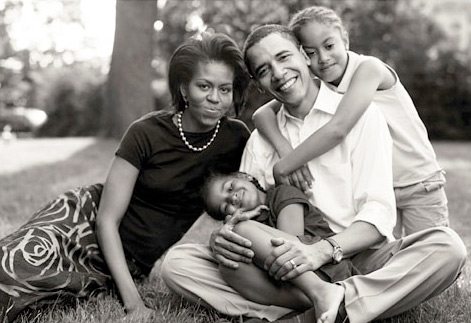 (Michelle and Barack with daughters Malia and Sasha)
(Michelle and Barack with daughters Malia and Sasha)
Barack Obama is my choice for president. I’ve already explained why in previous blogs. But if Obama isn’t elected, it would be hard to blame racism. Republicans aren’t going to vote for him, not because he’s black, but because, even worse, he’s a Democrat. And for the most part, Obama has garnered more popular support among white voters than any other candidate. If Obama is elected, I believe that through his leadership skills and intelligence he will usher in a dynamic new era of government by inclusion rather than secrecy. Like John F. Kennedy, Obama will inspire a younger generation and invigorate the older generation to take greater part in their government, society, and community.
But there are many obstacles this New Era will have to face. A sagging economy. War abroad. Faltering education.
And, worst of all, the movie Horton Hears a Who.
This isn’t a review of the movie, it’s a review of how Hollywood sometimes contributes to the divisiveness within the country. Ironically, Horton Hears a Who has done more damage to our society than the recent slate of politically motivated movies about the war in Iraq (Rendition, Stop-Loss, Lambs for Lions, Redacted, In the Valley of Elah, etc.) has done good. For one thing, more people saw Horton than saw all the other movies combined.
How can a beloved Dr. Seuss story do so much harm? Well, the original book by Dr. Seuss is just fine, a timeless tale that has been delighting children since it was first published in 1954. The story of the brave elephant that is willing to endure the harshest condemnation from his friends and community in order to protect those in need is a wonderful lesson for children.
But then along comes the movie. To make the story long enough for a full-length movie, a subplot was added about the mayor of Whoville who has 96 cheerful daughters and one brooding son. This is where things take a nasty turn. Basically, the mayor ignores his 96 daughters in order to groom his uninterested son to become mayor. Why doesn’t he groom one of his much more enthusiastic daughters? And, of course, it is the brooding son who, in the end, saves the entire world of Whoville. The daughters? They get to cheer from the sidelines. While it’s true that in the book a “very small shirker named Jo-Jo†does add his tiny voice to the din and thus saves Whoville, but that promotes the idea that we all have our part to play in our community, not that sons are smarter than daughters.
“Hey, it’s just a cartoon,†you might say. But this particular cartoon will be seen by millions of children around the world. And they will come away with a clear impression that a single son is worth more than 96 daughters. Those boys are inherently more valuable than girls, and more likely to be successful (in this case, in saving the world) than girls.
What’s especially insidious here isn’t just that the subplot was written and approved and filmed, but that since the movie has come out, there hasn’t been a popular outcry about it. That we don’t even ask why, in the years it took to make the movie, no one along the line said, “This isn’t a good message to send to our kids.†Is it because sexism is so ingrained in our society that we don’t even flinch at it when it’s shoved in our faces?
What’s all this have to do with racism?
Well, if our society is willing to tolerate any form of social injustice and discrimination toward any single group, then they have created a breeding ground for injustice throughout society. If we allow sexism, ageism, homophobia, religious intolerance, then racism can only flourish as well. We expose our impressionable children to funny cartoons about wacky animals voiced by famous actors and what do we think is going to happen. Will a little girl step out of Horton feeling empowered and motivated, or just slightly less capable than the little boy walking beside her?
I don’t think the filmmakers are evil or that they deliberately set out to send this awful message. Somehow it seems worse that they didn’t notice.
Maybe after eight years of Barak Obama’s presidency, our society will have evolved to a place where the filmmakers and the audiences won’t tolerate even the subtlest forms of discrimination. At least with Barak Obama, we have hope that such a world might be.
(Photo credit: Barack Obama)
